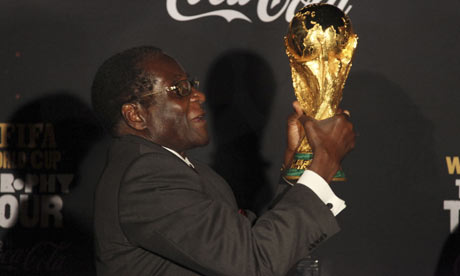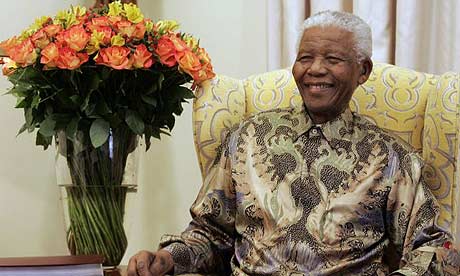If South African President Jacob Zuma didn't have enough on his plate, with raging violent crime, unemployment of up to 40%, the world's largest HIV/AIDS population, a recession and the 2010 soccer World Cup, his first few months in office saw a wave of strikes and violent protests against poverty and low wages. Zuma, 67, spoke to Africa bureau chief Alex Perry at his official residence, Mahlamba-Ndlopfu, in Pretoria in August.
TIME: You've always portrayed yourself as a cipher for the ANC, an implementer of policies decided by the party, rather than a policy-maker. Does that still stand now you're President?
Zuma: The ANC makes policy, not individuals. Anything that we talk about regards policy to a huge degree reflects the debates that have been held inside the party. And on policy, we have done very well — our policies have been very good. We have five priorities: education — critical; health — critical; rural development; job creation; and land reform. (See pictures of Johannesburg's preparations for soccer's World Cup.)
As the leadership, we take the broad policy statements and make them specific; we implement policy, we put the party's conclusions into practice. So our job is also to look at our performance since 1994 and our leadership during 15 years of democracy. And there has been weakness in implementation. That means that we need to put more thinking into our implementation. We have to do things differently.
TIME: You're saying there have been mistakes.
Zuma: That's part of the reality we have to look at. It's 15 years into our democracy, and you cannot still say after 15 years, after 20 years, that you are not able to do X, Y and Z. At this point in time, we have to do something extraordinary to make sure we are able to continue to move forward. Admitting your mistakes is also because I believe that honesty is important in politics. You lose nothing by admitting to where there have been weaknesses. When you recognize that, you can correct it. And it's only when you admit there have been deficiencies and weaknesses that you make sense to the people, who can see them for themselves. (See pictures of South Africa after 15 years of ANC rule.)
TIME: What mistakes specifically?
Zuma: Take the old ministry of minerals and energy. Mines are what [have] shaped the economy of South Africa, it will always remain an anchor of this country — and so it needs its own focus. Energy is also critical for the country. But they were in the same ministry. And as we were experiencing economic growth, and rolling out electricity to rural areas, suddenly there was an electricity shortage. That must indicate weakness. And if we did not see that, that energy was going to be a problem, that points to a shortcoming. So we now have separate ministries for mines and energy, each with its own focus.
Or take education. The reality is that our concentration has been on higher education rather than on basic education. There has been no focus on the more basic area. And we did not talk to the managers, to the school principals — it was just left to the bureaucracy. That's why we had a meeting of school principals from across the country in Durban. And education is one of the most important things. If we do not pay attention to education, we will never move forward.
There was no national plan. Departments tended to work side by side in silence. There was a need for a planning commission so we had an overarching plan for the country. So we created one. That also speaks to the need for the leadership to be well informed.
Finally, we also created a minister of the presidency to evaluate performance. That's a new way to check and ensure that there is implementation of policy and that there is performance. And that shows we are doing things differently. It's going to help us remove the slow walkers in government and identify and detect where there is corruption, instead of waiting for the auditor general's report. So you see we are reconfiguring government. We are trying to do things differently to achieve the implementation of ANC policy. (See Jacob Zuma's profile in the 2008 TIME 100.)
TIME: Some people haven't given you much time to correct the mistakes of the past. Already, thousands of protesters are out on the streets, demanding delivery of the services they have been waiting for. Some of the demonstrations have even been violent. Are you worried?
Zuma: These problems don't come from just now. Still, you can't fault the people. After 15 years, people are saying: where is the delivery? I'm not worried. We are aware of our shortcomings. These challenges are based in reality. And that's why we restructured ourselves. This renewal came at the right time to meet these challenges. And it's in how we meet them that we will show how we will be successful. Nevertheless [the protests] say to the government that we had better move. It's a wake up call: Deal with this! Pay serious attention! If we do not deal with these things now, people will lose confidence in the ANC.
See TIME's Pictures of the Week.
See the Cartoons of the Week.
TIME: What is [former finance minister and now planning commission head] Trevor Manuel's new role in this new set-up? Is he, as some say, effectively a Prime Minister?
Zuma: He is not a Prime Minister. He had the very specific task of helping me and the country to work out a national plan, to ask: where shall we be by this time? Where is the country going? His role is also to monitor and evaluate. The reason Trevor was appointed was because he had been minister of finance and had an understanding of the workings of all government departments and what happens inside them. And that's important to shape a national plan. But his commission makes recommendations and the cabinet debates them. And it is housed inside the presidency because he needs the president's authority so that this becomes the presidency's plan. The same goes with performance monitoring — that also has to be done from inside the presidency.
TIME: Admitting errors, taking a pragmatic, results-based approach, those are not things Africa's liberation movements have always been good at. In fact, as their time in power goes on, many have become more vociferous in blaming their mistakes on the past and old enemies. I'm thinking particularly of Zimbabwe. Are you jettisoning that liberation movement baggage?
Zuma: Nobody can deny that when Zanu-PF [Robert's Mugabe's Zimbabwe African National Union-Patriotic Front] came on the scene, there was a lot of delivery, in health and remarkably in education. But what they lacked is what we are doing: realizing when things are not going right. After a decade or so in power, the success of liberation begins to challenge you. The situation tests your clarity, your understanding. And it's after that that many liberation movements have turned into something else and abandoned what they were. (See Jacob Zuma's profile in the 2008 TIME 100.)
The ANC came to that point. And what it is doing now — renewal — is a measure of how it is able to rise to the occasion. It's paying attention to its principles and values. It's talking about the renewal of the organization and how we have to do things differently. We cannot say after 15, 20 years that we cannot resolve our issues. This is about our capacity to adapt to new conditions, to analysts what are the new challenges. That's what the ANC is doing right now. We are just past the stage where we might have turned into something else — and where we might have fallen. I think that, instead, we have jumped forward.
TIME: Is there a sense in which you've had to introduce this renewal and create a new government structure to monitor yourselves because, with such a huge electoral majority, the polls don't do it for you? Are you trying to create the democracy — the accountability and transparency — that the ANC's majority negates.
Zuma: We're dealing with a party that is very strong and is loved by the people. The opposition might have many things to say but they are not very strong. They cannot challenge us successfully — we are too strong. And the problem is that such support and power can intoxicate the party and lead you into believing that you know it all. You take things for granted. So it's important to have a system that keeps you on your toes. This huge party must find a way to monitor itself vigorously. If there are non-performers, we'll take them out. Otherwise the party will end up unwieldy and in a mess.(See pictures of South Africa after 15 years of ANC rule.)
TIME: I notice another departure under your leadership. Traditionally, the ANC has taken on board the liberal attitudes of the left, including tolerance. But in Durban, you sounded very conservative on some social issues like the need for discipline in schools, alcohol and even sex and violence on television.
Zuma: I don't think it's conservatism. What we're saying is: let's have a conversation. Take alcohol. Liquor is used to dehumanize us. If you go to the Western or Northern Cape where, in some places, they have the tot system [paying workers in high-alcohol run-off from wine processing] up to this day, you go to areas that by 11 o'clock on a Saturday, people are already drunk and dizzy in the road. It's not doing any good to the citizens of this country. I think we have to take measures. Many people are not employed or do not have anything to do, so they spend their time in the tavern. They are not active, they are not useful. And there's the connection to crime — on Friday and Saturday, crime is very high and that's directly linked to drink. Any leader who does not take that seriously is allowing his citizens to go down the drain.
Or take television. There is too much violence. There is too much sex. Television brings that into my house: how to kill, how to cut off people's heads. It becomes a kind of education. Do you want to educate our young people in violence and sex? It's influencing young people into how to become criminals — young people like to repeat what they see in films. It's creating young people prone to violence, rape and criminality. It's not conservatism. It's saying: how do we deal with these things? It's saying: let's not keep quiet about these matters.
TIME: How do you merge your African heritage, being a proud Zulu who values his traditions, with being the leader of Africa's most westernized nation?
Zuma: It's not a problem at all. Things merge well in South Africa. Our constitution embraces equality of culture and language. They must be respected. We do not deny that we have different people in our country. We have a lot of diversity. But we also have unity in that diversity. That diversity is also our strength: our nation is a place of meeting of cultures and of ways of life. We want you as you are. We want a Muslim to feel his religion is recognized and a Christian to feel the same. That is how we became a country that is unique in the world, one that inculcates tolerance of others. My belief is that we are doing what many other countries have failed to do. For me, I am a Zulu. I also have in me experience in rural and in urban areas. But I should not be trying to be an American or more British. I must be a Zulu.
Source : http://www.time.com/time/world/article/0,8599,1943120,00.html


